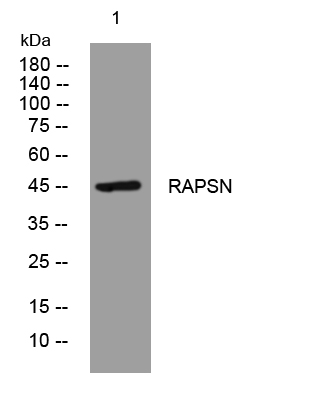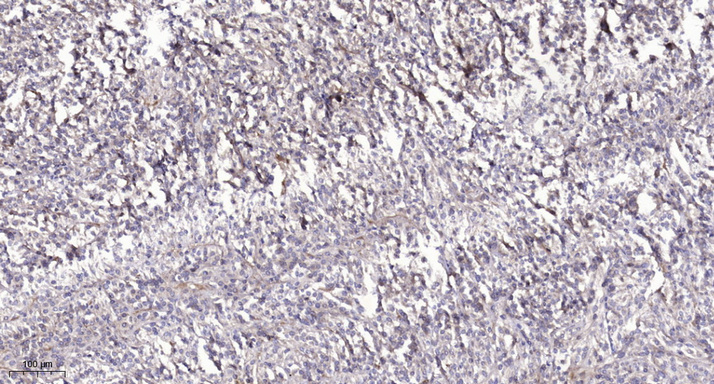RAPSN rabbit pAb
- Catalog No.:YT6963
- Applications:WB;IHC
- Reactivity:Human;Mouse
- Target:
- RAPSN
- Gene Name:
- RAPSN RNF205
- Protein Name:
- RAPSN
- Human Gene Id:
- 5913
- Human Swiss Prot No:
- Q13702
- Mouse Gene Id:
- 19400
- Mouse Swiss Prot No:
- P12672
- Immunogen:
- Synthesized peptide derived from human RAPSN AA range: 341-391
- Specificity:
- This antibody detects endogenous levels of RAPSN at Human/Mouse
- Formulation:
- Liquid in PBS containing 50% glycerol, 0.5% BSA and 0.02% sodium azide.
- Source:
- Polyclonal, Rabbit,IgG
- Dilution:
- WB 1:500-2000;IHC 1:50-300
- Purification:
- The antibody was affinity-purified from rabbit antiserum by affinity-chromatography using epitope-specific immunogen.
- Concentration:
- 1 mg/ml
- Storage Stability:
- -15°C to -25°C/1 year(Do not lower than -25°C)
- Molecular Weight(Da):
- 45kD
- Background:
- This gene encodes a member of a family of proteins that are receptor associated proteins of the synapse. The encoded protein contains a conserved cAMP-dependent protein kinase phosphorylation site, and plays a critical role in clustering and anchoring nicotinic acetylcholine receptors at synaptic sites by linking the receptors to the underlying postsynaptic cytoskeleton, possibly by direct association with actin or spectrin. Mutations in this gene may play a role in postsynaptic congenital myasthenic syndromes. Alternatively spliced transcript variants encoding multiple isoforms have been observed for this gene. [provided by RefSeq, Apr 2011],
- Function:
- disease:Defects in RAPSN are a cause of congenital myasthenic syndrome type 1d (CMS1D) [MIM:608931]; also called congenital myasthenic syndrome associated with acetylcholine receptor deficiency. Congenital myasthenic syndromes (CMS) are inherited disorders of neuromuscular transmission that stem from mutations in presynaptic, synaptic, or postsynaptic proteins. Postsynaptic disorders result from mutations in proteins forming the subunits of the muscle acetylcholine receptor (AChR). The kinetic abnormalities of AChR result in either prolonged ion channel activations that underlie "slow-channel myasthenic syndromes" (SCCMS) or abbreviated channel activations that underlie the abnormally rapid decay of endplate currents in "fast-channel syndromes" (FCCMS). CMS1D is the third disorder associated with postsynaptic CMS which could result from mutations in the proteins forming the muscle AChR.
- Subcellular Location:
- Cell membrane; Peripheral membrane protein; Cytoplasmic side. Cell junction, synapse, postsynaptic cell membrane; Peripheral membrane protein; Cytoplasmic side. Cytoplasm, cytoskeleton. Cytoplasmic surface of postsynaptic membranes.
- June 19-2018
- WESTERN IMMUNOBLOTTING PROTOCOL
- June 19-2018
- IMMUNOHISTOCHEMISTRY-PARAFFIN PROTOCOL
- June 19-2018
- IMMUNOFLUORESCENCE PROTOCOL
- September 08-2020
- FLOW-CYTOMEYRT-PROTOCOL
- May 20-2022
- Cell-Based ELISA│解您多样本WB检测之困扰
- July 13-2018
- CELL-BASED-ELISA-PROTOCOL-FOR-ACETYL-PROTEIN
- July 13-2018
- CELL-BASED-ELISA-PROTOCOL-FOR-PHOSPHO-PROTEIN
- July 13-2018
- Antibody-FAQs
- Products Images

- Western blot analysis of lysates from U2OS cells, primary antibody was diluted at 1:1000, 4°over night

- Immunohistochemical analysis of paraffin-embedded human Colon cancer. 1, Antibody was diluted at 1:200(4° overnight). 2, Tris-EDTA,pH9.0 was used for antigen retrieval. 3,Secondary antibody was diluted at 1:200(room temperature, 45min).



